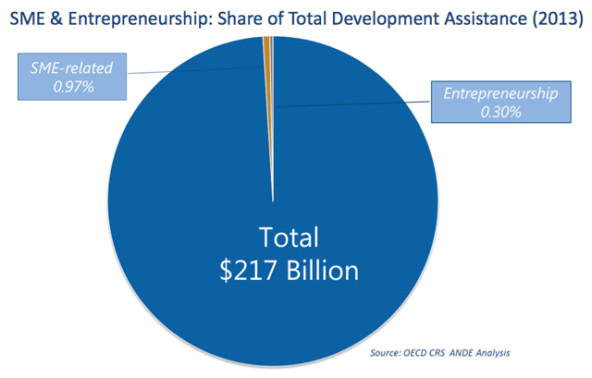Donors are increasingly turning to the private sector to achieve development goals, recognizing that it can provide job opportunities, build infrastructure, and offer services that replace the need for aid. We at the Aspen Network of Development Entrepreneurs (ANDE) have become increasingly convinced that small business is a critical tool for addressing social, environmental, and economic development goals. Throughout emerging markets we are seeing a proliferation of small, for-profit firms dedicated to addressing major development issues like sanitation, primary school education, and affordable health care. These emerging social businesses represent a sustainable mechanism that can adapt to the needs of each local context. Millions of people could directly benefit from their success.
Yet support for small and growing businesses (SGBs)—comprised of 5 to 250 employees and poised for growth—represents only a tiny fraction of the global development budget and global investment dollars.
In our “State of the SGB Sector” impact report, we share new analysis illustrating the development community’s commitment to small business as a solution to global challenges. In 2013, the latest year for available data from the OECD Creditor Reporting System, official donor disbursements to the broad small and medium enterprise (SME) sector were just over $2 billion. Entrepreneurship-specific projects received just $645 million in support—or 0.3 percent of the $217 billion total disbursement.

The data is discouragingly clear: Support for small-business entrepreneurship is not a high priority for global development agencies. Among donor projects in the energy sector, for example, of the $14 billion disbursed in 2013 only $3 million was specifically related to SMEs or entrepreneurship. Similarly only $3 million was committed to water and sanitation SMEs, which represents only .03 percent of the total disbursements to SME-related projects in the sector. But if aid agencies want to see leverage for dollars spent, increasing support for SGBs is a very promising strategy. According to the Small Enterprise Assistance Funds (SEAF) report on its portfolio, every $1 invested in an SME generates, on average, an additional $13 in the local economy.
Are you enjoying this article? Read more like this, plus SSIR's full archive of content, when you subscribe.
The issue isn’t only about driving more funding to entrepreneurship but also helping development agencies maximize impact. Unfortunately, much of the funding that does exist goes to narrow programs that support one element of the infrastructure required to foster entrepreneurship—access to finance, business incubators, or training programs. However, we believe that development programs aimed at SGBs are most effective when they incorporate a systemic perspective, intentionally integrating multiple streams of support that entrepreneurs need. The development community should cultivate entrepreneurial ecosystems, not implement piecemeal projects. These kinds of comprehensive efforts will typically include multiple players, including local entrepreneurial support organizations and investors, global foundations and corporations, national governments, and international development agencies. While these kinds of collaborative initiatives are complex in nature, focusing efforts on specific geographic areas within countries and targeting specific industries that offer opportunities for local entrepreneurs can simplify them.
Last fall, ANDE hosted a two-day working session for funders to dive into the entrepreneurial ecosystem concept. Thirty participants, including representatives from foundations, corporations, and donor agencies from multiple continents, dug into the challenges and opportunities for integrated support programs, ultimately reaffirming the need to increase overall support for entrepreneurship and to pursue more ecosystem-focused approaches.
The good news is that major international development agencies have begun to implement comprehensive ecosystem projects. The Dutch Good Growth Fund, a government initiative, has incorporated a systemic approach to promoting entrepreneurship, linking technical assistance to SMEs and financial investment, within a geographic area. And the Swiss Economic and Development division (SECO) recently contracted with a consortium including Swisscontact to develop strategies to cultivate entrepreneurial ecosystems in four Baltic countries, Vietnam, and Peru. Other agencies, including USAID and Millennium Challenge Corporation in the United States, Department for International Development in the UK, and Department of Foreign Affairs, Trade and Development in Canada are actively exploring comprehensive ecosystem projects.
These new initiatives are great to see, but we hope that even more will develop in the coming months and years. As partnerships become the norm and institutions bring a diverse set of resources to bear—including human and financial—this approach to cultivating entrepreneurial ecosystems can be a transformative one. And while $645 million a year to support entrepreneurship globally is not nearly enough to create significant transformation, it’s a start. Even a modest increase could have a huge impact, especially if we strategically design funding to support the long-term development of local entrepreneurial ecosystems in emerging markets.
Support SSIR’s coverage of cross-sector solutions to global challenges.
Help us further the reach of innovative ideas. Donate today.
Read more stories by Kate McElligott & Randall Kempner.

